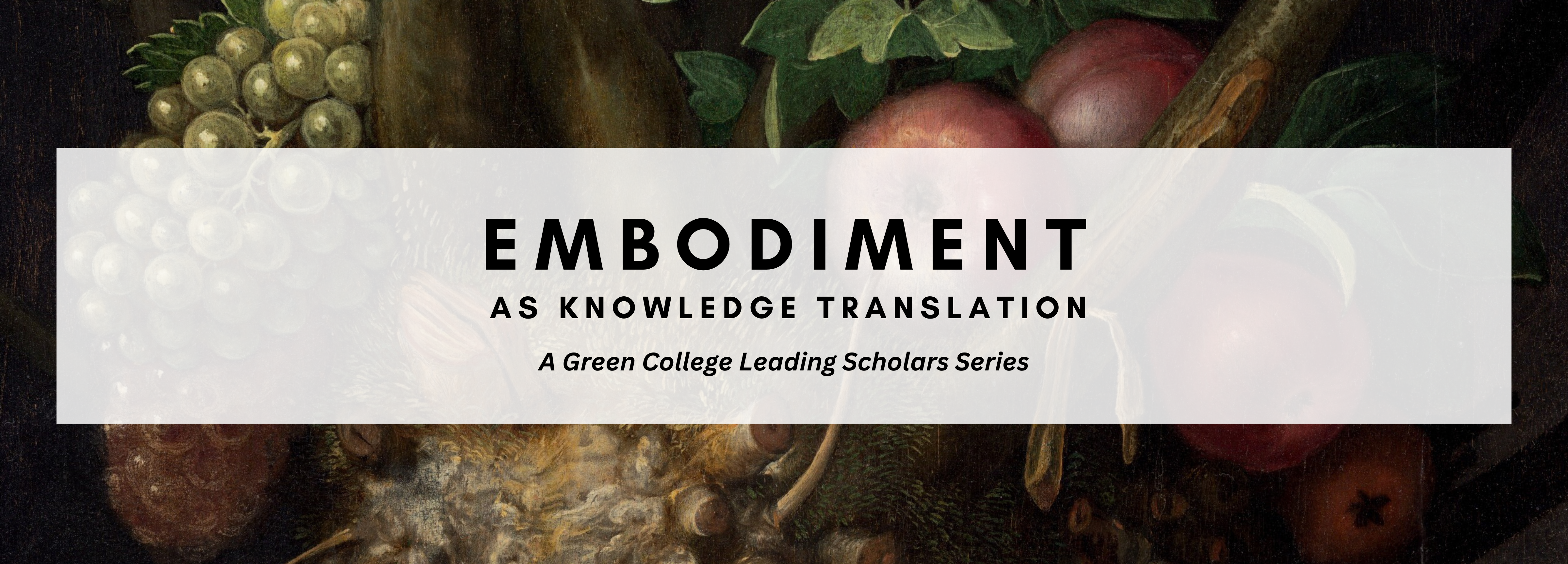Engaging in Collaborative Decision-Making and Understanding Community Values Through Integrated Research-Practice Partnerships
-
Paul Estabrooks, Health and Kinesiology, University of Utah
Coach House, Green College, UBC and livestreamed
Thursday, March 21, 5-6:30pm with reception to followin the series
Embodiment as Knowledge Translation -
Knowledge translation involving the dissemination and implementation of evidence-based health promotion and disease prevention interventions is improved when collaborative and integrated research-practice partnerships are employed. These partnerships consider both research- and practice-based evidence that moves beyond only assessing program efficacy. Further, they involve interdisciplinary and interprofessional partners in intervention and strategy prioritization as well as collaborative decision making on project design, outcomes and information needed for sustainability. This presentation will share examples that align with the hypothesis that integrated research-practice partnerships lead to interventions that are practical, effective, reach more participants and are more likely to be sustained in practice.
 Paul Estabrooks, PhD, is a Professor of Health & Kinesiology and Associate Dean for Community Engagement in the College of Health at the University of Utah. Dr. Estabrooks uses community and system-engagement strategies to integrate health promotion and disease prevention interventions in community, corporate and clinical settings. This work has led to a better understanding of the strategies and processes that lead to the large-scale adoption, implementation, and sustainability of physical activity, healthful eating, diabetes prevention and weight management interventions focused on resolving health inequities. Currently, Dr. Estabrooks is a multiple principal investigator on projects examining obesity prevention in children from American Indian families, tobacco cessation for people seeking care in community health centers and integration of rapid genome sequencing in the NICU. He is also a co-investigator on projects focused on designing and testing implementation strategies to integrate physical activity promotion in primary care, diabetes prevention through cooperative extension, childhood obesity program implementation capacity in rural communities and the integration of screening for traumatic brain injury in community-based organizations that provide services for women who have experienced intimate partner violence. Across each of these projects, Dr. Estabrooks has applied the RE-AIM framework in combination with dissemination and implementation science contextual frameworks (i.e., PRISM, iPARIHS, CFIR) to better understand context, strategy, mechanism and outcome relationships.
Paul Estabrooks, PhD, is a Professor of Health & Kinesiology and Associate Dean for Community Engagement in the College of Health at the University of Utah. Dr. Estabrooks uses community and system-engagement strategies to integrate health promotion and disease prevention interventions in community, corporate and clinical settings. This work has led to a better understanding of the strategies and processes that lead to the large-scale adoption, implementation, and sustainability of physical activity, healthful eating, diabetes prevention and weight management interventions focused on resolving health inequities. Currently, Dr. Estabrooks is a multiple principal investigator on projects examining obesity prevention in children from American Indian families, tobacco cessation for people seeking care in community health centers and integration of rapid genome sequencing in the NICU. He is also a co-investigator on projects focused on designing and testing implementation strategies to integrate physical activity promotion in primary care, diabetes prevention through cooperative extension, childhood obesity program implementation capacity in rural communities and the integration of screening for traumatic brain injury in community-based organizations that provide services for women who have experienced intimate partner violence. Across each of these projects, Dr. Estabrooks has applied the RE-AIM framework in combination with dissemination and implementation science contextual frameworks (i.e., PRISM, iPARIHS, CFIR) to better understand context, strategy, mechanism and outcome relationships.
Organized by Green College Leading Scholars, this series invites perspectives on how to locate, understand, experience, enact and care for embodiment. How is the body activated as source and repository of knowledge? Where do we find generative inquiry into the affective and social dimensions of producing and exchanging knowledge? This series of lectures and roundtables explores the performance of care; relational accountability; and the emotional labour involved in archival work, storytelling, translation, healthcare, creative practices and teaching.
Series Conveners: Abdul-Fatawu Abdulai, Nursing; Irem Ayan, French, Hispanic and Italian Studies; Stephen Dabugblor, Journalism, Writing and Media; Julia Henderson, Occupational Science and Occupational Therapy; Sara Ann Knutson, History; Jillian Lerner, Art History, Visual Art and Theory; Jasmin Ma, Kinesiology; Elif Sari, Anthropology; Rosanne Sia, Gender, Race Sexuality and Social Justice; Logan Smilge, English Language and Literatures; Helena Zeweri, Anthropology; and Mila Zuo, Theatre and Film

-
Unless otherwise noted, all of our lectures are free to attend and do not require registration.
Custom Lecture Fields
|